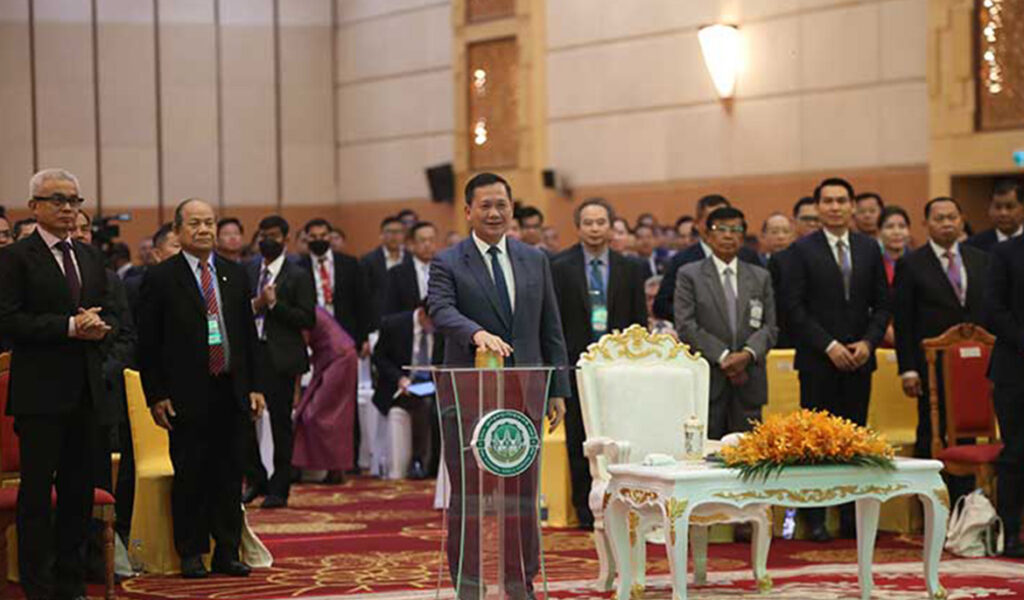Prime Minister Hun Manet yesterday encouraged all ministries and institutions to strive to establish a digital ecosystem – a group of interconnected information technology sources – for business and trade operations aimed at creating a foundation for a better business environment while luring more foreign investment into the Kingdom.
Presiding over the official launch of the Cambodia National Single Window (NSW), Mr Hun Manet said that the system will be a key factor in the digital ecosystem business operation, making the Kingdom’s trade facilitation more effective by connecting domestic businesses and trades with the region and the world.
The Premier said, “The launch of Cambodia NSW and the Automated Customs Data System (ACYUDA) will facilitate trade in the country by changing the mode of operations from paper-based to paperless which can be viewed as a unified victory or an amalgamated achievement of the ministries-institution of the Royal Government of Cambodia (RGC) in working under the approach of the Dynamics of Stakeholder System.”
Meas Soksensan, Secretary-General and Spokesperson of MEF told Khmer Times, “The NSW is an online platform that links with the existing systems in Cambodia such as E-customs, Pre-Arrival Manifest System and ACYUDA – the automation systems for customs clearance of the export-import.”
This system allows traders to apply for licenses, certificates and other required documents related to the export-import of goods to all competent institutions aims to obtain permission to use for competing customs clearance forms by electronic means, he added.
Highlighting the implementation of NSW, Aun Pornmoniroth, Deputy Prime Minister and Minister of Economy and Finance (MEF) said the implementation of NSW was developed in three phases. First, it was initiated by the General Department of Customer and Excise (GDCE) and the Ministry of Commerce (MoC).
“In the second phase, NSW was connected with the ASEAN Single Window (ASW) – a trade facilitation for the ASEAN economic community – along with four other government institutions.
Later, 10 were added in the third phase, a total of 16 ministries and institutions.”
He underlined that the NSW aimed to create an online service to facilitate businessmen and traders requesting official documents related to the export and import procedure before releasing goods and products from GDCE.
“The system came with a range of benefits on the provision and receipt of public services with efficiency, effectiveness, transparency, time and cost saving,” Pornmoniroth added.
During the ceremony, Mr Hun Manet recommended relevant ministries and institutions that have not merged with the NSW must accelerate their process while those that have participated need to continue improving and developing the project with high quality and efficiency.
“The steering committee of the NSW must monitor and evaluate the implementation as well as continue to improve and expand the functions of the systems related to businesses and trade to meeting practical demands of businesses in the country.”
The Prime Minister added that the private sector should participate, acquire full advantage from this online platform, and provide constructive feedback for further improvement of common interests.
Most importantly, the Premier recommended all ministers and institutions under the guidance and coordination of the Digital Economy and Business Committee (DEBC) must continue to strive to bring other services online and work together to develop the ‘Digital Ecosystem for Business’ as a foundation towards expanding other reform sites aims to improve business environment and promote Cambodia’s attractiveness for investment.
According to GDCE, the NSW has been developed to provide electronic services (online) to facilitate faster and more transparent export-import procedures and reduce costs while providing consistency and reliability for proceedings from the start of the required procedures to the completion of customs clearance.
The most important goal of the system is to strengthen cooperation between government-to-government (G2G), government-to-business (G2B) and business-to-business (B2B).
The Cambodia NSW complied with the United Nations Centre for Trade Facilitation and Electronic Business (UN/CEFACT) issued in July 2005, six months later it was accepted by the World Trade Organization (WTO) and added to the ASW agreement in February 2017. (khmertimeskh)



